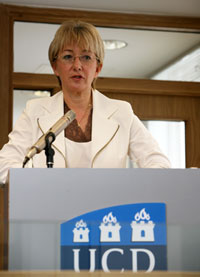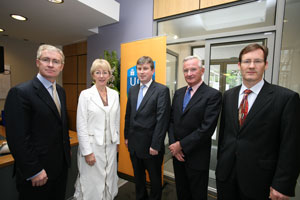Posted: 24 April 2007
Minister Hanafin opens UCD St Vincent’s Genome Resource Unit
With the sequencing of the human genome, scientific researchers can identify errors in genes that cause or contribute to disease. And using this genetic information, medical science aims to develop new ways of treating, curing or even preventing disease.
Five decades after the molecular structure of the DNA was first described by biologists James Watson and Francis Crick in 1953, the world witnessed the completion of the Human Genome Project; the sequencing of the 3 billion DNA letters in the human genome. This sequence data is stored in public databases which are available to scientists worldwide in order to help them to de-code the molecular mechanisms behind disease initiation and progression.
The official opening of the UCD St Vincent’s Genome Resource Unit by the Minister for Education, Mary Hanafin TD, on 23 April 2007, sees Irish patients making further contributions to the Human Genome Project. The new unit will enable scientists to share and compare genetic data from Irish patient populations with data from patient populations worldwide.

Mary Hanafin TD, Minister for Education and Science speaking at the official opening of the UCD St Vincent’s Genome Resource Unit
“Debilitating diseases such as heart failure, cancer arthritis and diabetes are major research priorities for clinical investigators,” said the Minister at the official opening. “This facility will allow leading researchers to investigate these diseases further with the potential of designing focused therapies for these disabling conditions. This is a valuable addition to improving the quality of care for patients in the future.”
The Minister also spoke of the need for continued investment in the higher education sector and in particular on our research capabilities. “Across a broad spectrum of funding agencies there is now an unprecedented level of research investment available for individual scholars and for large research programmes spanning, science technology and the humanities – much of it building on the critical infrastructure provided through the PRTLI. The aim of that programme is to provide world class research in our third level institutions. Since 1998 €605million has been provided. Cycle 4 of the programme which was announced earlier this year, will provide a further €190million.”
According to Dr Hugh Brady, President of UCD, maximising the synergy between clinicians on hospital sites and bench-based scientists is vital for the success of translational medicine.
“This investment by UCD in partnership with St Vincent’s University Hospital, the Dublin Molecular Medicine Centre and the HEA delivers an integrated clinical network, and enables UCD to play a leadership role in the provision of Irish clinical networks through the auspices of the European Clinical Research Infrastructure Network,” he said.
“The new facility will enable the delivery of clinical research excellence in partnership with the UCD Conway Institute, especially in the areas of inflammation, vascular biology and diabetes, and biological imaging.”

Dr Hugh Brady, President, UCD; Mary Hanafin TD, Minister for Education and Science; Dr Seamas Donnelly, Director, UCD ST Vincent’s Genome Resource Unit; Prof Noel Whelan, Chair, St Vincent's Board; Dr Risteard O'Laoide, Chair, St Vincent's Medical Board
“With this facility we can maximise the partnerships between patients, medical researchers at St. Vincent’s University Hospital and government funding agencies,” said Dr Seamas Donnelly, Director of the UCD ST Vincent’s Genome Resource Unit. “It will also enable us to play a major international role in Translational Medicine and ultimately make a difference by developing new therapies for our patients.”
